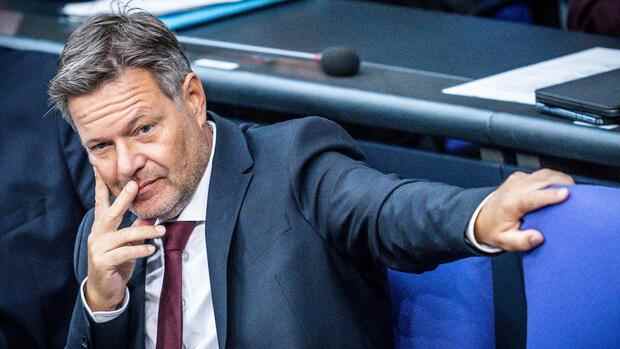The Green politician announced support for German companies.
(Photo: dpa)
Berlin In the fight against high energy prices, the federal government supports the EU proposals for cheaper electricity for households and small businesses. “To relieve private households, the introduction of an electricity price brake is planned,” says a paper from the economic department that was available to Reuters on Thursday.
A basic consumption is subsidized. In addition, the market price is considered an incentive to save. The same applies to small businesses. If a quick EU solution does not come, this will be implemented nationally.
When it comes to skimming off the so-called random profits of the producers, with which the relief is to be paid, the federal government deviates from the Commission’s plan: Germany wants a revenue cap for green electricity and another regulation for nuclear and lignite electricity. The EU energy ministers will discuss on Friday.
Economics Minister Robert Habeck (Greens) also announced a price brake for gas in the Bundestag, but this is more complicated. The most important thing is to stop price manipulation by Russian President Vladimir Putin.
Top jobs of the day
Find the best jobs now and
be notified by email.
The EU Commission has also introduced a price cap for Russian gas. Putin responded by threatening that no oil or gas would be delivered at all. Only small amounts of gas are currently flowing to Germany via Ukraine, and nothing has come through the most important pipeline Nord Stream 1 for about a week.
Habeck wants to support German companies
Habeck said that until prices drop again, the company also wants to be given comprehensive support. “We will put up a broad rescue package.” The focus is particularly on small and medium-sized companies. For this purpose, the energy cost containment program for industry will also be opened up to them.
>> Read also: Fertilizer manufacturers in Europe are in dire straits – the competition in the Gulf senses their chance
The criterion of trade-relatedness, such as competition with foreign companies, should be dropped. The energy cost share of the product or sales will also apply here, and the program is also limited in time.
In October, a gas-for-money program will also be launched for companies. Anyone who reduces consumption will be compensated financially.
The economy has been sounding the alarm about the high energy prices for a long time: “A huge wave of bankruptcies is already underway, and it will get much bigger. Tens of thousands of jobs are at stake,” said the president of the family business, Reinhold von Eben-Worlée, the “Rheinische Post”. “The federal government hasn’t really understood that yet.”
So far, it is unclear to what extent the electricity prices for smaller companies and households will be subsidized and how large the planned quota will be. According to the plans, this will be financed by skimming off the so-called random profits of the electricity producers.
A price cap for gas is being discussed at EU level.
(Photo: IMAGO/Future Image)
Despite the relatively small increase in production costs, they benefit from the high sales prices, which are largely influenced by gas prices. It is now planned to introduce a revenue cap for the producers. The difference between this and the higher exchange prices for electricity could then be used by the states to curb prices.
Electricity price brake in the EU under discussion
While the EU Commission proposal only mentions a price limit of 200 euros per megawatt for all producers, according to the paper by the Ministry of Economic Affairs, Germany wants a two-stage system: Since electricity from wind or solar energy is mainly sold on the short-term spot market, it should be here set a revenue cap.
>> Read also: “Actually, bread should cost ten euros” – high costs are threatening the existence of bakers
Since other electricity is mostly sold on the futures market, i.e. in the medium and long term, a “crisis contribution” from the producers is planned here. This is not defined in more detail in the paper.
The Union and also the governing party FDP are vehemently calling for the continued operation of the last three German nuclear power plants, which according to the current legal situation will be switched off at the end of the year, also to curb electricity prices. “Their continued operation would not only stabilize the grids physically, but also send a welcome price signal through more supply on the electricity exchanges,” said FDP leader and Finance Minister Christian Lindner at a “Handelsblatt” conference.
Habeck only wants to keep two southern German nuclear power plants on standby as an emergency reserve over the winter. But there is also a dispute with the operator of the Isar 2 nuclear power plant, who has described this as technically unfeasible.
More: Will the energy crisis become a financial crisis? How Sweden wants to prevent domino effects
